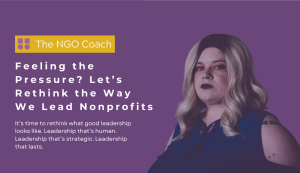As NGO leaders, we’re constantly adapting to a changing world. From new technology to evolving funder expectations, the nonprofit sector is shifting faster than ever. So, what does the future hold? Let’s look at what coming and how to prepare. What are the key trends that will shape nonprofits over the next 5-10 years and how can we prepare to embrace these changes?
1. Technology and AI in Nonprofits
Technology is no longer a nice-to-have—it’s a must-have. Over the next decade, artificial intelligence (AI) and tech tools will help nonprofits automate everyday tasks, manage data, and improve communication with donors. Using AI can free up time for what really matters: serving your community. From predicting funding trends to analysing programme outcomes, nonprofits that embrace AI and data analytics will be ahead of the game.
2. Digital Transformation for Nonprofits
The shift to digital isn’t slowing down. Digital transformation will continue to be a major trend for NGOs, helping us reach more people and deliver services online. Whether through virtual training, digital fundraising, or online support services, being tech-savvy will help nonprofits expand their reach and improve their impact. Embracing digital tools is essential for growing your nonprofit in this digital age.
3. Sustainability Through Social Enterprise
As funding becomes more unpredictable, more NGOs will turn to social enterprise models to generate their own revenue. By creating mission-driven businesses, nonprofits can become more sustainable while still staying true to their purpose. This shift allows organisations to be less dependent on grants and donations, ensuring they have the resources to keep delivering impact for the long term.
4. Collaboration and Partnerships
In the coming years, collaboration across sectors will become even more important. Nonprofits will increasingly work with businesses, government agencies, and other NGOs to address complex issues like climate change, inequality, and public health. These cross-sector partnerships will pool resources and expertise, allowing nonprofits to scale their efforts and create lasting change.
5. Equity, Diversity, and Inclusion (EDI)
Equity, diversity, and inclusion will remain core values in the nonprofit sector. Moving forward, nonprofits will need to integrate EDI into their programmes, governance, and leadership. It’s not just about ticking boxes—it’s about making sure our organisations truly reflect the diverse communities we serve and are creating spaces where everyone feels included and valued.
6. Increased Funder Expectations for Transparency
Today’s funders and donors, especially Millennials and Gen Z, expect more than just a thank-you note. They want to see exactly how their contributions are making a difference. Transparency and accountability will be more important than ever, with nonprofits needing to provide clear, detailed reports that show measurable outcomes. Adopting robust impact reporting tools will help build trust and engage your supporters.
7. Wellbeing and Mental Health Support for Nonprofit Leaders
Burnout is real, and it’s a growing issue in the nonprofit sector. In the future, more focus will be placed on mental health and wellbeing for nonprofit leaders and staff. Organisations will need to prioritise self-care, build supportive kaimahi / team cultures, and offer resources like leadership coaching and peer support to prevent burnout and keep leaders healthy and effective.
8. Climate Action and Environmental Responsibility
Nonprofits will also play a bigger role in addressing climate change. Many organisations will begin implementing environmental sustainability into their work. This could be through advocacy, green practices, or partnerships with environmental groups. Nonprofits aligning their missions with climate action will protect the planet and resonate with younger, more environmentally-conscious donors and funders.
The Future of Nonprofits is Bright—If We’re Ready to Evolve
The next 5-10 years offer exciting opportunities for nonprofits to innovate and grow. Whether it’s embracing technology, building strategic partnerships, or prioritising diversity and wellbeing, NGO leaders need to stay ahead of these trends to make a lasting impact.
As we look to the future, it’s clear that adaptability and forward-thinking leadership will be the keys to success. So, let’s get ready to evolve, embrace these trends, and lead our organisations into a brighter, more impactful future.
Check out more of my posts
- How Inexperienced Board Members Can Be Dangerous for Your NonprofitAs The NGO Coach, I spend a lot of time sharing stories, strategies, and practical tools to help nonprofits thrive. My focus is usually on… Read more: How Inexperienced Board Members Can Be Dangerous for Your Nonprofit
- Showcasing Your Nonprofit’s Impact with ChatGPTShowcase Your Nonprofit’s Impact with ChatGPT is a quick video + AI prompt sheet that’s all about helping time-poor nonprofit leaders show their impact with ChatGPT!
- Feeling the Pressure? Let’s Rethink the Way We Lead NonprofitsIf you’re leading a nonprofit right now and feeling the pressure — you’re not alone. In the past few weeks, I’ve spoken with NGO leaders… Read more: Feeling the Pressure? Let’s Rethink the Way We Lead Nonprofits
- How to Lead Well Without Burning Out: What the Latest Research Tells UsThe latest research backs up what many of us already know: nonprofit leadership is tough, and the way through isn’t to just push harder. It’s to work smarter, more strategically, and with more support.
- Chatting About Community, Leadership & the 115,000 NGOs in AotearoaTalking with B-Side Stories about the heart of our nonprofit sector This week I have a great kōrero with Victoria Quade. She hosts B-Side Stories… Read more: Chatting About Community, Leadership & the 115,000 NGOs in Aotearoa






